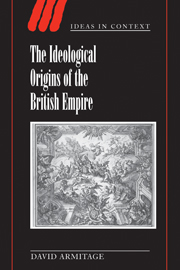Book contents
- Frontmatter
- Contents
- Acknowledgements
- 1 Introduction: state and empire in British history
- 2 The empire of Great Britain: England, Scotland and Ireland c. 1542–1612
- 3 Protestantismand empire: Hakluyt, Purchas and property
- 4 The empire of the seas, 1576–1689
- 5 Liberty and empire
- 6 The political economy of empire
- 7 Empire and ideology in the Walpolean era
- Bibliography
- Index
- Ideas in context
1 - Introduction: state and empire in British history
Published online by Cambridge University Press: 06 July 2010
- Frontmatter
- Contents
- Acknowledgements
- 1 Introduction: state and empire in British history
- 2 The empire of Great Britain: England, Scotland and Ireland c. 1542–1612
- 3 Protestantismand empire: Hakluyt, Purchas and property
- 4 The empire of the seas, 1576–1689
- 5 Liberty and empire
- 6 The political economy of empire
- 7 Empire and ideology in the Walpolean era
- Bibliography
- Index
- Ideas in context
Summary
… the word, empire, conveys an idea of a vast territory, composed of various people; whereas that of kingdom, implies, one more bounded; and intimates the unity of that nation, of which it is formed.
By the second quarter of the eighteenth century, the British Empire comprehended the United Kingdom of Great Britain, Ireland, the islands of the Caribbean and the British mainland colonies of North America. The frontiers of that extensive monarchy were guarded by a common religion and by the Royal Navy. The gentle, but powerful influence of laws and manners had gradually cemented the union of the provinces. Their free, white inhabitants enjoyed and produced the advantages of wealth and luxury. The image of a free constitution was preserved with a decent reverence. The Hanoverian kings appeared to possess the sovereign authority, and devolved on their parliaments all the executive powers of government. During a crucial period of almost fourscore years (1688–1760), the public administration was conducted by a succession of Whig politicians. It is the design of this, and of the succeeding chapters, to describe the ideological origins of their empire, though not to deduce the most important circumstances of its decline and fall: the American Revolution, which dismembered the British Atlantic Empire, lies beyond the immediate scope of this book.
The history of the rise, decline and fall of the British Empire has most often been told as the story of an empire whose foundations lay in India during the second half of the eighteenth century.
- Type
- Chapter
- Information
- The Ideological Origins of the British Empire , pp. 1 - 23Publisher: Cambridge University PressPrint publication year: 2000
- 4
- Cited by



